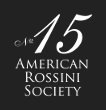A return to the lake with Alberto Zedda

In connection with the Metropolitan Opera’s December 2015 performances of “La Donna del Lago”, we examine some aspects of this masterpiece with the help of an essay by Alberto Zedda.
Somehow, the miracle of this opera seems to elude even many Rossini lovers.
Perhaps some refelctions from Alberto Zedda can help us understand why. He expressed some thoughts on this work at the time of the 2001 performance in Pesaro Italy. Below are some of the excerpts from his essay.
Maestro Zedda writes that this opera “opens up an unknown landscape and develops new themes.”
“It is not an easy opera to revive even for the modern listener” he continues,”even though ( the listener) is familiar with such concepts as ambiguity, abstraction, and metaphor.”
Among other things Maestro Zedda singles out “ the prominent role entrusted to the orchestra
, different from that of the Italian composers who preceded Rossini, and whose only thought was to supply a practical support for the voice.”
The use of the hunting horn ( both off stage and on), the use of the band , the use of the harp, and the curious orchestration ( four clarinets among other things) creates a color and a sound which in itself makes this work unique.
The opening scene where Giacomo /Uberto comes upon Elena really defines the characters. Maestro Zedda observes, ” Radiant with the thoughts of love for her Malcolm, Elena’s simple and enchanting little song ‘Oh mattutini albori’ is pervaded with an elusive and subtle eroticism. When Giacomo asks her for help in finding his way, her reaction is one of unforced naturalness. After bringing him to her home, Elena and Giacomo ‘converse’ politely and their behavior is chaste and friendly, but the music invests their meeting with a sweet enchantment and a sickly tension so that no one is surprised when Giacomo’s heart succumbs to love.” Based on these observations it is safe to say that this is not a skirt-chasing King, nor a flirtatious, feisty young woman as some have unfortunately portrayed them (ed).
Giacomo learns that Elena is the daughter of his enemy and is betrothed to Rodrigo ( whom she does not love ) But, Zedda points out, “the anxious languidness that Giacomo’s presence has aroused in Elena’s childlike femininity gives him a ray of hope.
Elena, believes her restlessness is simply her longing to see Malcom again, and in all innocence she cannot help unconsciously exercising a fatally seductive charm.” The concluding duet between Elena and Giacomo is, in Zedda’s words, “one of Rossini’s prettiest dialogues of love, certainly the most sensual, the most loaded with passion…(Because) Elena’s ecstasy is aimed and Malcom and not at Giacomo, Rossini is free from any necessity to pain a direct encounter between lovers, and so is able to give full reign to his art without too much reserve. “
At this point Rossini has laid the foundation for the two principal characters and he is free to turn his attention to the third, Malcom.
Zedda writes. “ Malcom’s entrance aria ‘Mura felice’ is permeated with melancholy which his loving anxieties seek in vain to camouflage, he tells us of love’s enchantment. Our sympathy with his youthful enthusiasm warns us somehow that his destiny is not of the happiest.” Malcom, Zedda states, “ belongs to Romantic culture and his interpretative powers need to be enough to give emotion and presentiment to a cabaletta, the leading theme of which could easily become banal.. Malcom needs to give weight to Elena’s uncertainty and magnanimity to Giacomo’s renunciation.” It would seem that Malcom has the toughest job in this opera (ed)
Although we are just at the start of La Donna del Lago, this fundamental understanding of the characters has already been presented by Rossini ( and pointed out by Zedda)
Does one need to know these things to enjoy the opera? Certainly not. But hopefully the interpreters are aware and will use this awareness to give us memorable performances of this rarely heard gem. They certainly have the vocal credentials to do so.
ROF 2016 revised program.

There have been some changes to the program.The final performance of Ciro in Babilonia has been moved to the final evening of the Festival ( Aug 20) And the Florez gala has been moved up to the 19th.
In addition, Monica Bacelli will be giving the bel canto concert on Aug 17th
Touched by the Magic Wand of Rossinian Madness
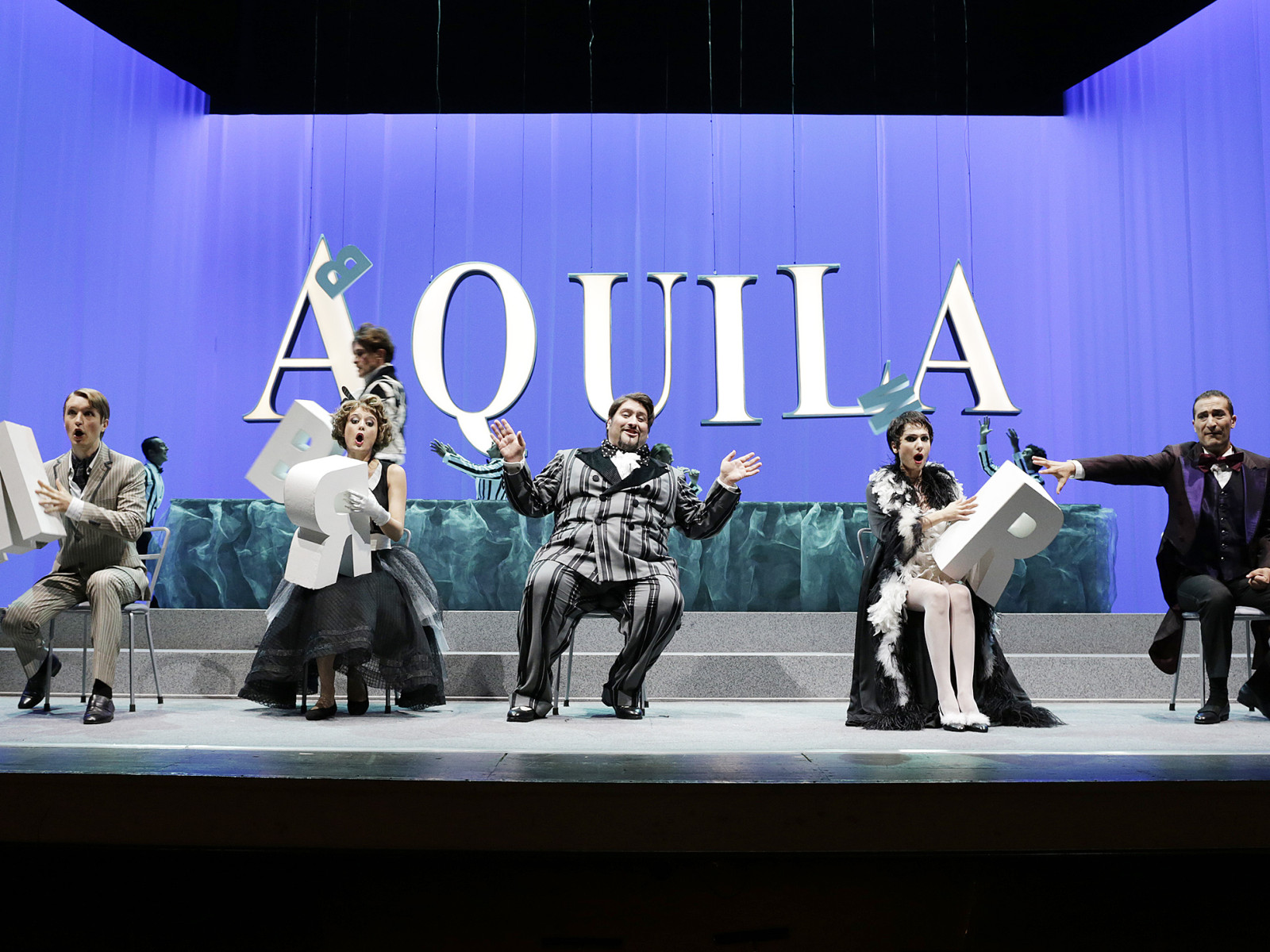
One of the special delights of attending the Rossini Opera Festival in person is coming in contact with other Rossini lovers from around the world. This summer a number of them spent hours at breakfast at one of the Pesaro’s welcoming hotels discussing the events of the previous day. Among them was Jürgen Gahre, a knowledgeable and personable journalist from Germany, who was also busy posting his reviews. He graciously agreed to share it with Rossini America, and thanks to the assistance of his friend Boyd Mullan provided us with this translation. We think you will enjoy the excerpts from his review. A link to the full review is posted at the end.
Many thanks to both!
Touched by the Magic Wand of Rossinian Madness
By Jürgen Gahre
“If you haven’t yet laughed in your whole life,” the great French novelist Stendhal advised a grumpy, puritanical Englishman two hundred years ago, “then go to Naples and see Rossini’s La gazzetta.” Today however he would have to go to Pesaro, for what director Marco Carniti has deftly conjured up on the stage of the Teatro Rossini is hilariously funny and so lively that the three-hour opera just flies past. Carniti makes do with a long catwalk made up of interchangeable parts and achieves fine effects with fanciful costumes in the style of the fifties and an expressive use of lighting. It is well seen that Carniti comes from the world of ballet for the colourful action on the stage has a dance-like lightness, especially in the lively ensemble scenes. One witty idea follows hard on the heels of another and with every addition the Rossinian roulades come faster and faster right up to the ecstatic climax. All of this finds its visual counterpart down to the tiniest detail: newspapers fall in long lines from above, letters are sent whirling around to make ever more new words, all of a sudden the stage turns into a boxing ring — with scant resources great effects are achieved!
What exactly happens in La Gazzetta, which was composed in 1816 for Naples? The rich, puffed up Don Pomponio has had the absurd idea of advertising for a husband of appropriate social class for his daughter Lisetta. She however has long since decided on Filippo, the charming owner of a hotel in Paris, and then when a self-important Madama La Rose and another father with his daughter turn up in the same hotel with similar matrimonial intentions the stage is set for all sorts of errors, entanglements and confusions. A good performance of La Gazzetta stands or falls with the casting of the part of Don Pomponio, and this is something that Pesaro is well placed to provide, for Nicola Alaimo is a buffo artist to his fingertips. He employs his great physical bulk to extremely comic effect, in order to underline the ridiculous pomposity of this deranged rich man. Carniti has him accompanied constantly by the mute Tommasino (a character that does not figure in Rossini) who serves the Don with slavish obsequiousness and interprets the will of his master by means of gestures and acrobatic-type contortions. An absolute triumph of the director’s art!
Enrique Mazzola guides the orchestra of the Teatro Comunale di Bologna with great verve through the score and captures perfectly its ‘Prosecco’ spirit and all the delightful absurdities of a musical work that simply bubbles over with joie de vivre. Accordingly Hasmik Torosyan in the role of the strong-minded Lisetta is able to deploy her brilliant, crystal clear soprano voice to optimum effect, Vito Priante (baritone) is the subtlest of Filippos, and Maxim Mironov as a lovesick Alberto is an engagingly bright and flexible tenor.
When at last the turbulent action approaches its climax, when the comedy reaches the level of absurdity in the whirling confusion of the closing scene and everyone has been touched by the magic wand of Rossinian madness, the right moment has arrived for a political message. Marco Carniti demonstrates the need for culture by means of a masterly coup de théâtre which reduces the unspeakable, oft quoted statement of the Italian finance minister Tremonti that culture is really superfluous (Con la cultura son si mangea) to absurdity.
The audience showed its gratitude to all those who took part with frenetic applause. The undeservedly seldom performed Gazzetta has been brilliantly rehabilitated by this outstanding interpretation.
The complete review in German can be found at:
http://www.kn-online.de/News/Aktuelle-Nachrichten-Kultur/Rossini-Opera-Festival-La-gazetta-in-Pesaro
ROF’s La Gazza Ladra on “World of Opera” with our gift to you!
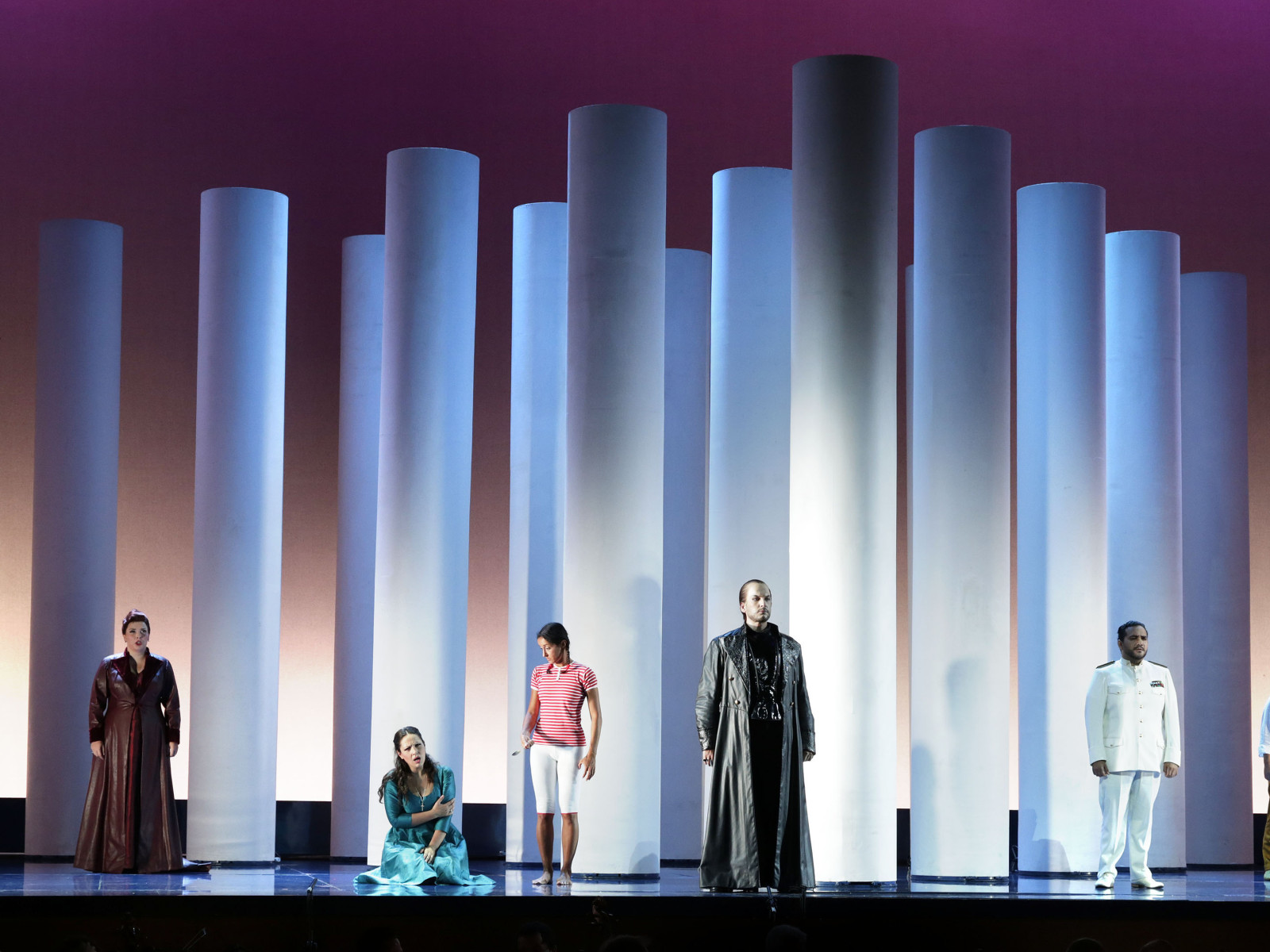
The radio series, World of Opera heard on stations throughout the United States will be broadcasting “La Gazza Ladra” during the week of October 17th. For local listings and exact dates and times, please check this link.http://worldofopera.org/about/world-of-opera-stations.
This gives Rossini fans in the US the opportunity to listen to these live performances at a time more convenient than those enjoyed by Europeans. No longer will you have to take a VERY LONG LUNCH break at work!!! You can even listen in the car – make sure to roll down the windows so that Rossini can spread throughout the land!
In connection with this event, The Rossini Opera Festival publication department has generously made available the ebook of the program that accompanied these performances in Pesaro. Thanks to Carla Di Carlo’s beautiful editing, you may obtain this program to enhance your enjoyment of the broadcast. Simply send an email to info@rossiniamerica.org, with the subject line La Gazza Ladra, and we will attach the .pdf file to our reply!!
American,Rene Barbara, is the featured tenor. Check out our interview with him here on our site. Here he is pictured with Nino Machaidze.
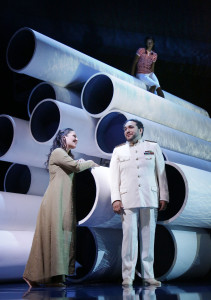
Rossini on demand!!!

Let’s face it, American audiences (especially on the West Coast) are at a disadvantage when it comes to streaming of programs from Europe. But the BBC has come to our rescue with two upcoming “on demand” broadcasts at bbc.co.uk/radio3. For 30 days after the broadcast you can listen and “re-listen” to two of the operas featured at ROF2015.
On October 8, “La Gazzetta” with its newly discovered ensemble will be broadcast.
Then, on October 10, “La Gazza ladra” with American tenor Rene Barbera will be featured. Happy listening!!
ROF’s Messa di Gloria, September 18 on Rai3

Messa di Gloria, along with two cantatas, all rarely performed, will be broadcast on www.radio3.rai.it, September 18, at 20:30 Italian time (4:30 ET). Hopefully you will have the opportunity to listen in even though we know it is difficult because of the awkward time.
This is a fascinating work because as with many Rossini gems it is hard to categorize. The program notes available during the Festival were,as usual both informative and entertaining.One is transported back to a time where there seemed to be a lot of borrowing mischief.
Listen for hints (subtle and not) of fragments that show up later in Rossini’s later works. Among them are “Bianca e Falliero”, “Il Viaggo a Reims”, “Le Comte Ory”, and what is characterized as a pre-echo of “Guillaume Tell”! Indeed there is also some self-borrowing from “Aureliano in Palmira”!! None of this takes away from the enjoyment and beauty of Messa di Gloria.
The cast, pictured in rehearsal ( left to right) includes Dempsey Rivera,Juan Diego Florez,Viktoria Yarovaya, Jessica Pratt and Mirco Palazzi. Andrea Faidutti leads the chorus of the Teatro Comunale di Bologna and the Filarmonica Gioahino Rossini is conducted by Donato Renzetti.
This is a good opportunity to remind visitors to this site, that by becoming a member at the $75 level, you will receive the electronic form of the programs and cast lists for the works of each year’s Festival. A great way to follow along.
Next ROF season preliminary announcement
We will have more on this after this year’s ROF which starts in a few days. But it has been announced that the 3 primary operas for next season are
Il Turco in Italia
,
La Donna del Lago
, and
Ciro in Babilonia
( the award winning production last seen a few years ago)
More soon!
Listen to ROF2015 on RaiRadio3
Again this year, RAI is broadcasting ( listen live on their website)
the first performances of the three major works of the Rossini Opera Festival.
Monday, Aug 10
La Gazza Ladra
Tuesday, Aug 11
La Gazzetta
Wednesday,Aug 12
L’Inganno Felice
All performances are at 8 pm Italian time, 2 pm Eastern time.
Website:http://www.radio3.rai.it/dl/portaleRadio/Page-a92d14c3-2fa3-4df6-8b7d-f1c15eefdc0d.html#slider-1-1
Interview with Rene Barbera – making his ROF debut!
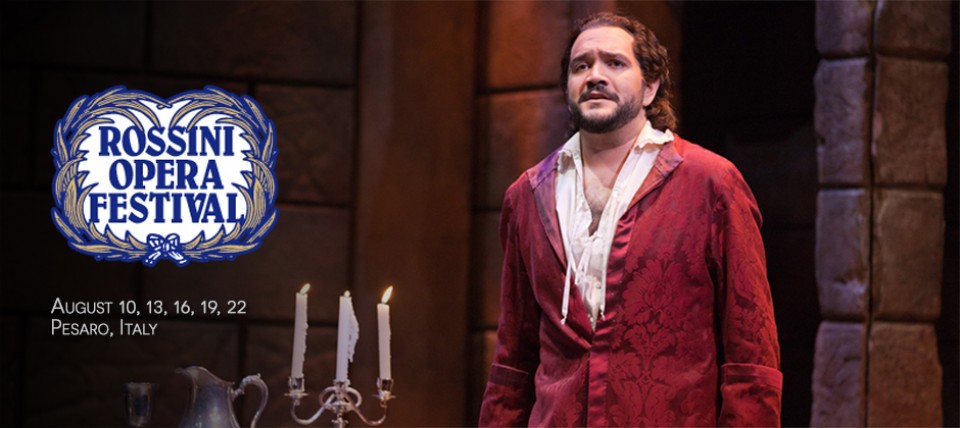
Rene Barbera is making his ROF debut this summer. He kindly agreed to be interviewed during rehersal period of La Gazza Ladra and we are so excited that yet another American singer will be part of the ROF family!
Q. How did you become a singer? Was there music in your home, a famil
member involved with the arts, or something else?
A – I started singing as a boy soprano in the San Antonio Men & Boys Choir when I was in Elementary School and continued through middle and high school in choirs. During my senior year I auditioned for a scholarship at the University of Texas at San Antonio and was offered a scholarship. It should be noted that I had planned on majoring in Music Education but it was suggested to me that I pursue a performance degree. After about a year I dropped out and decided I didn’t want to sing professionally and moved to Denver to live with my brother and work.
After a few weeks in Denver I managed to be in contact with Martile Rowland in Colorado Springs and, thanks to her offering a scholarship to the Vocal Arts Symposium, I was introduced to many students and teachers from the North Carolina School of the Arts (now the University of North Carolina School of the Arts).
Q. What brought you to Rossini? Did you hear a particular performance or
singer that inspired you? Were you guided by a coach or teacher who
recognized this might be a good fit for your voice?
A- Honestly, Rossini came to me. I had never planned to make Rossini a cornerstone of my career. In fact, I have always felt that my voice was best suited for Donizetti and Bellini, but, as it turned out, I apparently am more than capable of singing Rossini. Rossini has always been quite difficult for me to sing and I felt that I was not really very good at it. Evidently I was wrong. haha!
Q. Which Rossini roles have you sung?
A- I have only actually sung three Rossini roles at this point. Almaviva (Barbiere), Don Ramiro (Cenerentola), and Rodrigo (Donna del Lago) and about to debut my fourth here in Pesaro.
Q. We are delighted that you are appearing at the Rossini Opera Festival
this August in “La Gazza Ladra” . This will be the first time for you.
Have you performed with other members of the cast before?
A- I actually have met and sort of worked with two of the cast members before. Teresa Iervolino and Simone Alberghini… We were on the same productions in different casts. Simone in Naples and Teresa in Rome. I look forward to ACTUALLY performing with them as they are quite wonderful people and a lot of fun!
Q. How does preparing a new role work? Do you listen to recordings, watch
Youtube, or strictly “stick to the score?” Do you find when you arrive and
start rehersals that you have to “fine-tune” the vocal aspect of your
performance, or is it simply the dramatic part that needs to be worked on?
A- I usually listen to a recording once at the beginning of the process to get an idea of tempi and the general sound of the piece … after that I stick to the score as best I can and work with pianist once I have spent a little time on my part. There is definitely a time during rehearsals where fine-tuning has to happen. Nothing is ever as you expect when you begin working with other people. Everybody has their own interpretations and you have to adjust and react accordingly both dramatically and vocally.
Q.Singers have suggested that Rossini is particularly difficult and for
that reason some migrate away as their voice ages. Do you have any
thoughts on this, since you are still very young?
A- Rossini is quite difficult and, yes, not something that can usually be sustained for an entire career, at least not the same Rossini roles throughout a career. Most of the time a singer can continue to sing the more serious Rossini pieces later in their career while leaving behind the lighter fare. I can definitely understand the issue of the voice aging and maturing creating a need to move on in the repertoire. Being 31 and on the heels of another vocal shift (generally speaking this is around the time male voices have another change) I can easily identify with the migration. Each passing year I feel my voice leaning toward the desire for more legato and less coloratura or, at least, more variety in musical style. I feel Donizetti and Bellini beginning to whisper my name more loudly and, while I love Rossini, at some point I will have to answer their call. 😀
Q. Are there particular Rossini roles you look forward to adding to your
repertory?
A- In addition to looking forward to adding Giannetto (officially) I am open to whatever else comes my way. Honestly I don’t have anything specific I am chomping at the bit to do. I take what I’m given.
Q. Is there anything else you would like to share with us about singing,
your career, or your motorcycle? Pesaro is very motorcycle friendly BTW!!!
A- I’m somewhat of a motorcycle fanatic and Pesaro is VERY motorcycle friendly… I have taken notice of this already and wish I had a motorcycle here! I tried to find a way to rent one while in town but had zero luck!
Thank you for your time!
Interview with Simone Alberghini – 20 years at ROF!

Simone Alberghini will be at ROF in a few weeks performing in “La Gazza Ladra” Earlier this season we spoke with him after a performance of Cenerentola at Washington National Opera! We’ve been so lucky to enjoy your performances in Pesaro at the Rossini Opera Festival.
During the run of Cenerentola you were interviewed by Raissa Massuda and she has kindly given us permission to use her interview on our RossiniAmerica website. Here is the link to her blog (http://mandolinvision.blogspot.com/2015/04/interview-simone-alberghini.html) So, our questions will be a mixture of follow-up and new!
Q. You mentioned in the previous interview that you find the character of Figaro and Dandini as being full of Rossini. Having recently seen your Dandini, it was easy to believe. Are there particular “lines” or episodes that involve those characters that stand out for people who perhaps aren’t familiar with Rossini?
A: As I said, I think that it’s the continuously breaking the 4th wall that these kind of characters are doing all the time, commenting on the situations; for example, Dandini: already in the cabaletta of the entry aria (“ma al finir della nostra commedia”) he is telling the audience: we are going to have a lot of fun later! And, it is duly happening in the second act, during the second part of the sextet: “I’ve told you, the comedy would become a “tragedy” in the second act!”
Q. The character of Assur in Semiramide is quite a contrast from Figaro and Dandini, but he, too, has beautiful music. How do you see Assur whose importance to the opera is not always recognized. As a follow-up, the opera has some pretty grand duets, particularly between Assur and Semiramide. How much of your interpretation depends on “your” Semiramide?
A:First of all, a joke: You know what is the first note that Assur is singing? A “C”, in italian “Do”; now, on the score you then read: Assur Do: Absurd in italian 🙂 Do you think that is casual or Rossini intended it? I believe the second one!
The role of Assur is one of my favorite, one of the most demanding vocally and with a quite different kind of agility required from, let say, Dandini. In Assur, most of the coloratura’s or agility are “di forza”, to complete this strong, badass (can I say it?) character. The most beautiful part is already the long aria scene, beautiful dramatic and with a lot of acting required.
The part has also 2 beautiful duets, one with Semiramide and one with Arsace; of course, as always, duets are already a “concertato” way of singing, with the need to melt the 2 voices often as one, as musical instruments; very beautiful music and, of course, changing every time depending from the colleagues, the director and the conductor.
Q. Speranza Scappuci, mentioned that the performances improve throughout a run. James Levine once said every performance is a rehearsal. But are there some nights when things just seem to come together – and does the audience have anything to do with that?
A: Usually the second performance is the worst one, because everybody release the tensions that we’ve got at opening night…and usually later performances are more interesting musically, because everybody, singers, conductor, orchestra, chorus, got to know each other so well that is able to even feed from each other different musical “inputs”, the little “variations” that we can do overtime on a stage.
Of course, especially while playing comedies, the reactions from the audience are very important, getting us the feeling that our jokes are working and even dictating us, sometimes, the timing for those jokes.
One of the last performance in DC was one of my favorites: during the recitativo before my duet with Magnifico, a little kid in the audience reacted at a joke with a very loud, fresh, joyful laugh: I’ve totally lost it, began to laugh on the stage, and the rest of the audience with me… it was very sweet and funny.
Q. The Font production of Cenerentola has an unusual ending in that it appears that this all has been a dream. You commented that if it was a dream, Cenerentola is also a thief because she still has the bracelets! Perhaps you are already thinking of your appearance in “La Gazza Ladra” in Pesaro this summer?
A: hahaha, maybe, yes! But I’ll not be playing the thief magpie:) I’m looking forward to the summer, of course, to be part once again of a Festival that I love deeply.
Q. This will be the 20th anniversary of your first Pesaro performance. Is there something special about the Rossini Opera Festival you would like to share with us? Any favorite performances there?
A:Well, I loved Pesaro and the Festival so much that I’ve moved to Pesaro 8 years ago from my hometown, Bologna!
I had the luck to perform already many times at the ROF, alongside singers like M. Devia, B. Ford, S. Ganassi, M. Pertusi, D. Takova, J.D. Flores and many others; directed by L. Ronconi, P. Pizzi, D. Michieletto, G. Vick… conducted by G. Gelmetti, D. Gatti, C. Rovaris, M. Mariotti… I’ve been very lucky and I do keep a lot of beautiful memories; If I had to chose the best role I’ve sang here, maybe I’d say Blancac in the very beautiful and funny La Scala di seta production by D. Michieletto.
Q. Understandably Dandini is a favorite of yours and he does have wonderful music. Is there a particular Rossini role you have not sung yet that you would like to perform?
A: Probably the title role in Guillame Tell.
Q. Some singers have commented that Rossini gets harder to sing with age. Perhaps this is a function of their voice type or other repertorie they are singing. Do you have any feeling about this?
A: Rossini is very “athletically” demanding for the voice and do need a lot of freshness; personally, I’m starting, after more then 20 years of career, to explore some Donizetti and Verdi role, but I’ll try to keep as long as possible Rossini and Mozart in the repertoire, because I do believe they’ll help to keep the voice healthy.
Q. Final question – you mentioned the “Rossini” pizza which is only served in Pesaro.. is there a favorite place they serve it – or is it a secret?
A: Well, there are many good restaurant in Pesaro and will be wrong of me to choose just one; let say, Donn’Amalia, Farina and Dal Geme.
Thank you for your time. See you in Pesaro!!
